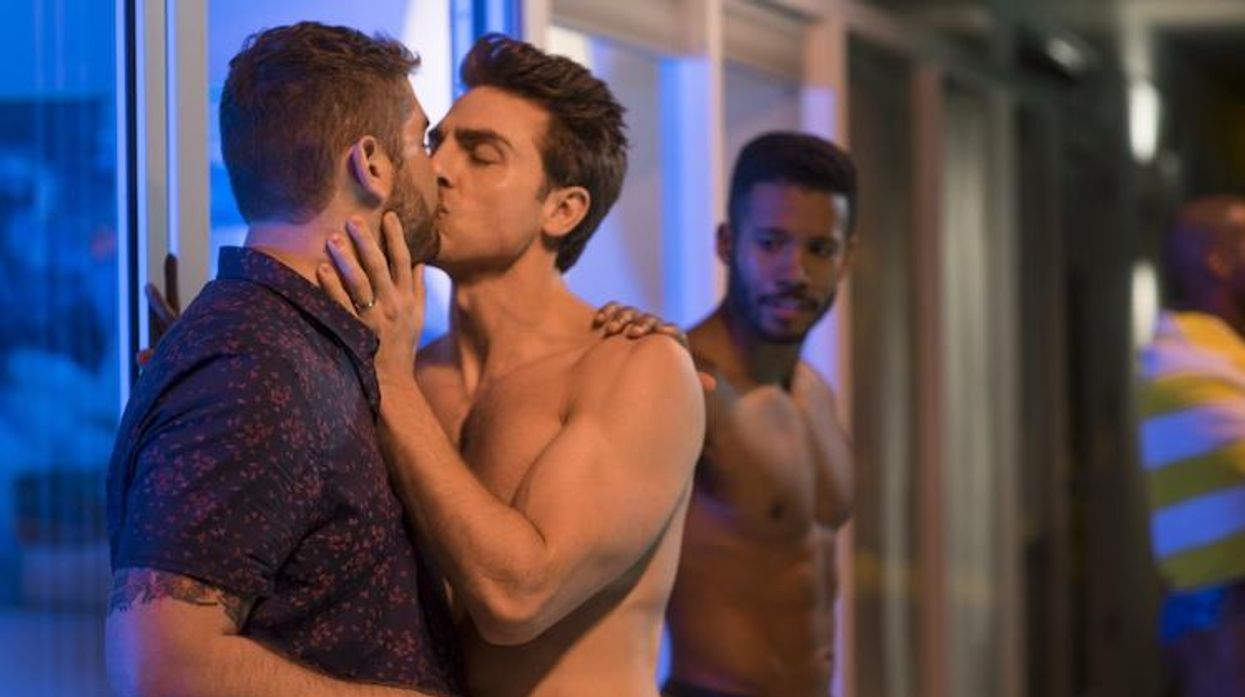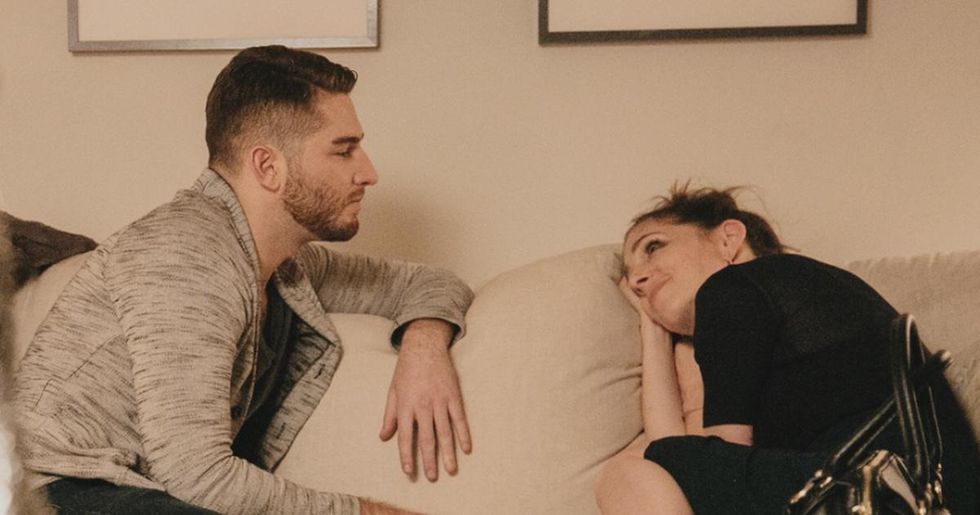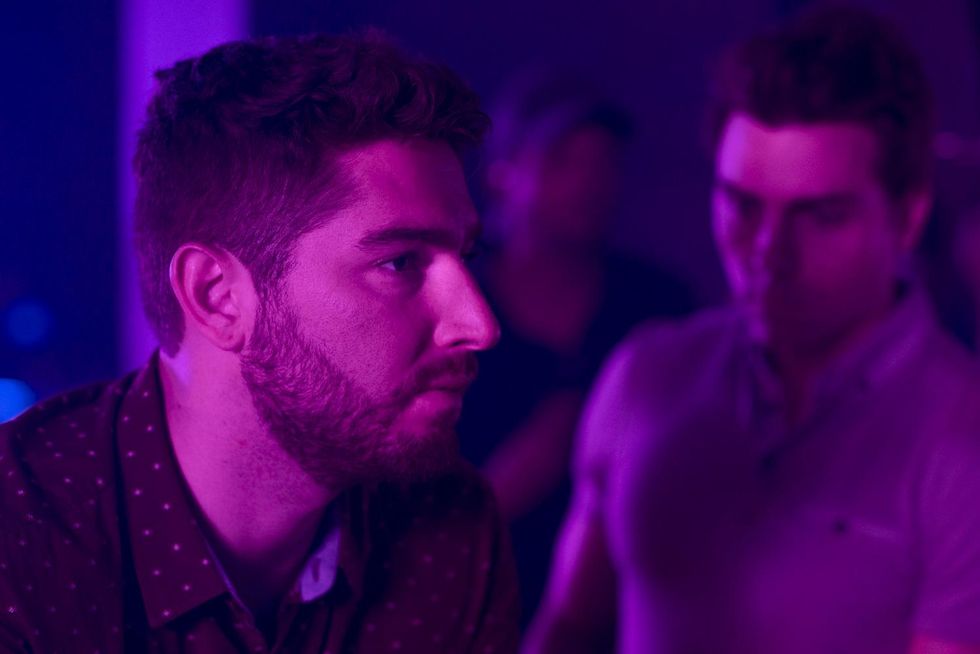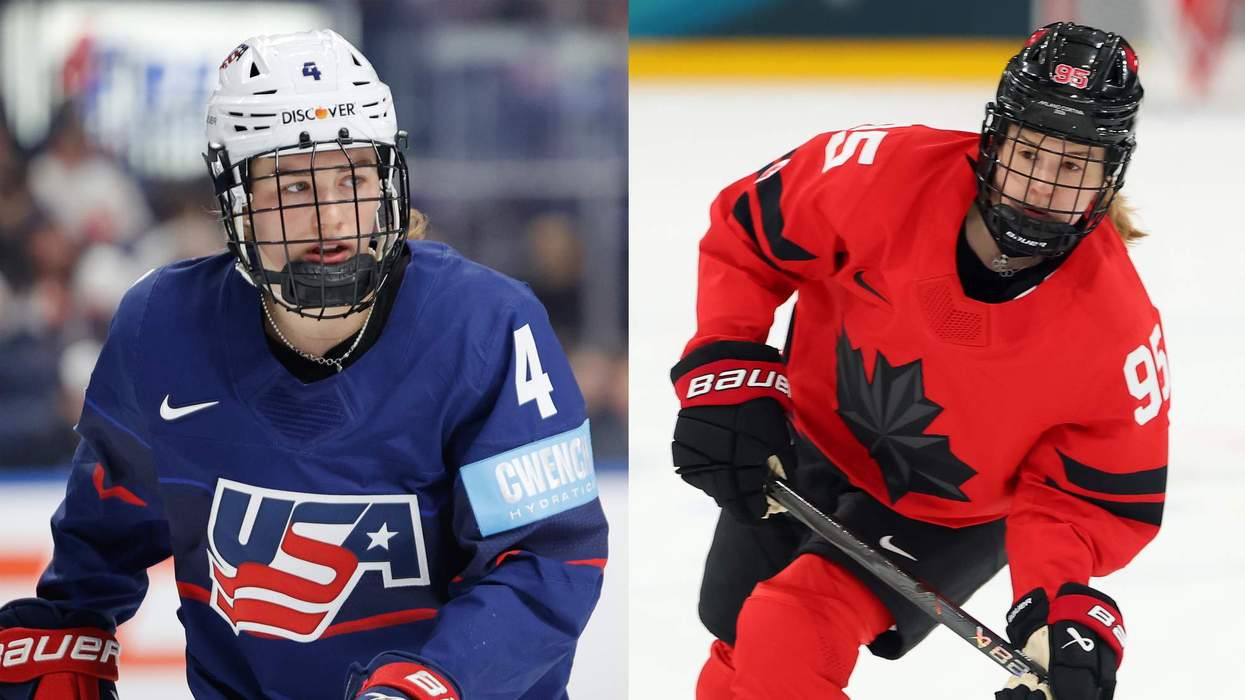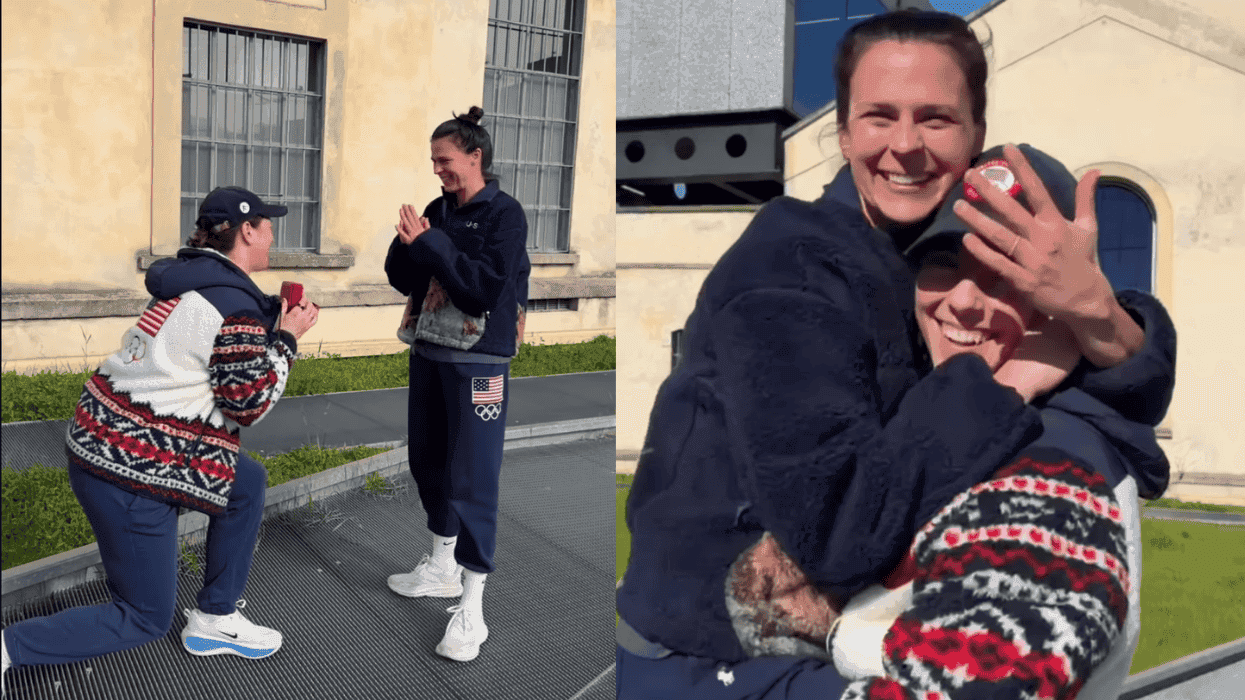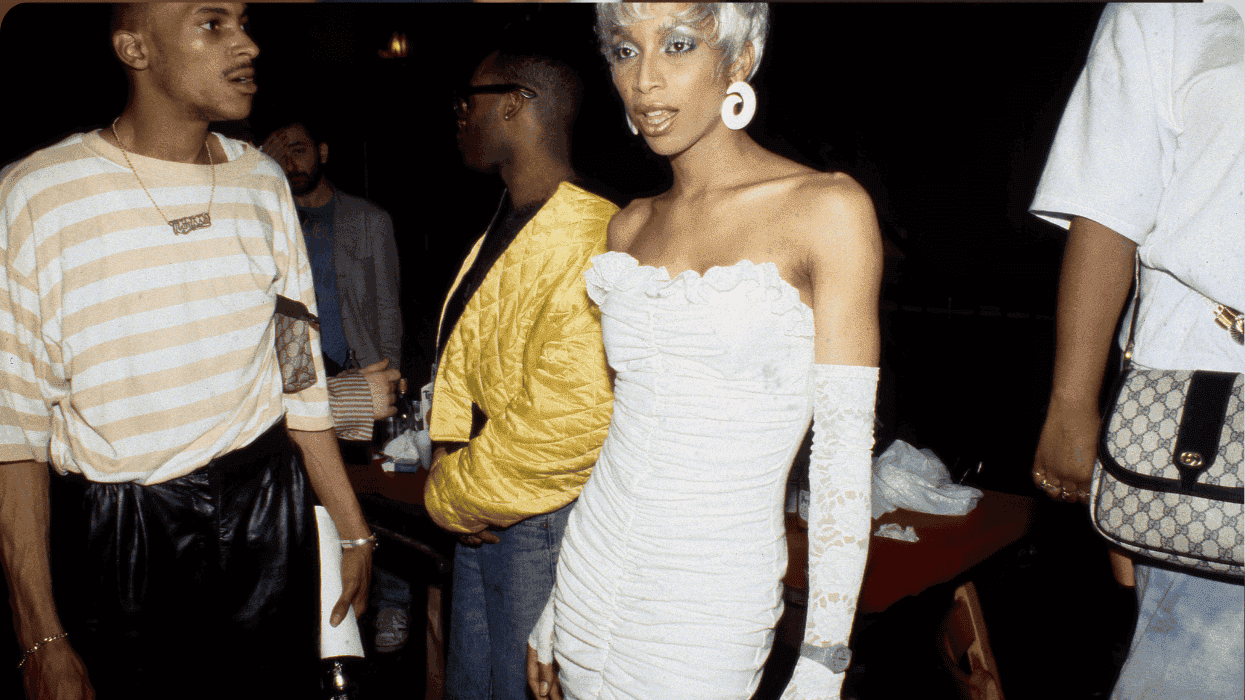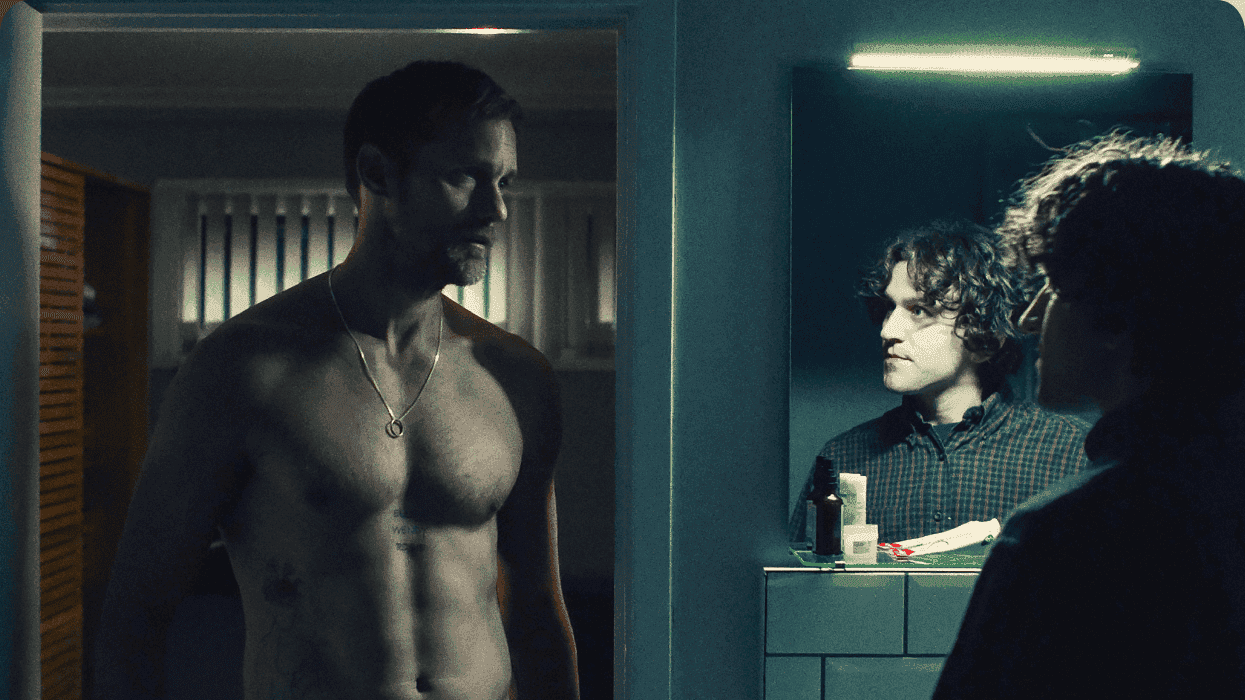Josh Feldman, a queer deaf writer and actor, hasn't had the best of luck with interpreters. Some have eavesdropped on his conversations with friends; others have tried to add him on Facebook after their session was over, a clear violation of the interpreter's code of ethics. "Using an interpreter is a necessary evil," he says, shooting a sly smile at his current interpreter from across the table. "If I can say it that way."
Feldman mines the awkwardness of being a queer deaf person in his new dramedy, This Close, premiering on Sundance Now on February 14th. Created by Feldman and Shoshanah Stern, and starring Marlee Matlin and Cheryl Hines, the series takes an uncensored look at the life of Michael Rosen (Feldman), still reeling from a breakup, and his best friend Kate (Stern), who is trying to navigate choppy waters as the sole deaf person at her PR firm. It's the first TV show created by and starring deaf people, who are usually portrayed on-screen by non-deaf actors. We caught up with Feldman to find out how he pulled it all off.
OUT: How did this whole project come about?
Josh Feldman: I'd been in LA. for a few years trying to make it as a writer, and Shoshanah had been here for quite a few years, and we started chatting about what we wanted to do together. I started writing stuff for her but nothing really hit the mark. And then, finally, we realized that we should write something that's very "us." Something we know best: friendship between a woman and a gay man. We were originally going to write the story of her and a hearing best friend. I didn't think I'd have any part in it. Then we showed it some people and they were like, "we don't understand why one of these characters is deaf." We got so tired of hearing no, no, no so we thought, why don't we just do it ourselves?
We put the project on Kickstarter with a goal of $10,000 and we reached that goal in less than a week. That got Superdeluxe's attention. We thought we'd just do this on our own but Superdeluxe [the series' producer] was like, no you're with us now. And thank god for that because they had the right people and they knew what to do. From there, we were selected to premiere at Sundance and that's how Sundance Now found us.
Mainstream shows often cast deaf characters who speak. I found it striking that in your show, in contrast, some of the most powerful moments are all in sign language. Did you always want it to be that way?
Most deaf characters in other shows speak because it's easier for hearing audiences to access the dialogue. But in reality, Shoshanah and I sign -- and I don't speak at all. So when I meet a hearing person, they expect me to speak for myself because that's what they've seen on TV. They just assume that deaf people do. I'm excited that my character doesn't speak at all. Shoshana, even though she can speak, she prefers not to.
Our goal was to make sure that the biggest moments in the show were done in sign language because in our lives, our biggest moments are in sign language.
Some of the funniest, most revealing moments in the show involve interpreters. In one scene, an interpreter is incompetent and slow, messing up Kate's translation; in another, she eavesdrops on a conversation between your character and Kate. It seems like the forced intimacy of having an interpreter could create all sorts of comedic situations.
Not all interpreters are as good as Robby [the interpreter he's using tonight.] Some are nosy or incompetent. It's hit or miss. But the sad fact is that only we understand what's going wrong in the moment. The hearing person thinks everything is fine. They think the hearing interpreter is fine and the deaf person is messing up.
Using an interpreter is supposed to be anonymous and confidential and the interpreter is supposed to somehow keep a boundary and not connect with me personally. They're supposedly a vessel who communicates the deaf person's thoughts. But most interpreters, sadly, don't just do that.
Does it ever happen that an interpreter eavesdrops on your signed conversation?
It depends on the interpreter. People can eavesdrop on your conversation and that's just naturally a part of life. But when I'm around other interpreters who I don't know well, I do make an extra effort not to sign so much because I don't want them to know what I'm saying.
There's another scene where both of your characters inform an airline rep of your disabilities and she orders you both wheelchairs. Does it happen often that people mistake one disability for another?
Yeah, and when it happens to me, I don't find it comical, I find it really annoying. But I also know it makes for really comical TV. People are like, "Does that really happen to you?" And it does. It happens all the time. There's more stuff that happens that we don't even show. Like, we're given braille menus. But to the mainstream world, one disability is like all disabilities.
Tell me more about your decision to portray Michael at a very turbulent, self-destructive point in his life.
Did you see the fourgy? Yeah, during my twenties, the periods of biggest personal growth happened after breakups. And that includes bad decisions. I wanted him to make those because eventually they lead to growth but not for a while.
Meanwhile, Kate is struggling with being tokenized at work as the deaf girl and she doesn't really know how to handle people coming up to her and telling her that she's brave and inspirational just for doing her job. There's a powerful moment when you tell Kate that she needs to just embrace the way people perceive her at work. Is this what people have told you? Did you feel like that was good advice?
I've never had to go through that. I'm more like Michael and Shoshanah is definitely more like Kate. We've had very different deaf experiences. I can't pass as a hearing person but she can speak for herself and hear somewhat. My character never pretends he can hear or speak so he never is forced to address those kinds of issues. He never needs to be told, "Hey, you're deaf, own it." But Kate tries to pass which creates problems for her. She hasn't fully embraced or accepted her deaf identity. But the sooner you own it, the sooner people will know that that's who you are.
You also experiment with sound, letting us hear what Kate hears when her hearing aid isn't working so well. Do you have any plans to continue tinkering with audio so we can better understand the sonic environment these characters live in?
People assume that if you're deaf you hear nothing. One thing Shoshanah and I keep telling people is that being deaf isn't about the absence of sound: I'm constantly feeling vibrations. I can hear cars drive past me, sirens. We had two sound designers that asked us, what is your perception of sound? Shoshanah has a perception that is based on the sound that comes through her hearing aid; mine is based on the sound that I feel physically, on my body. The sound designers then designed the sound based on our perspective.
When Kate is trying to hear her boss, it sounds like they're both underwater. Is that how her hearing aid always sounds to her?
You'd have to ask Shoshanah. But in the conversations she's said that her perception is based on her hearing aid and lip-reading. Sometimes those two methods clash. That's why she sometimes thinks her boss is talking about something other than the temperature. She's getting two different inputs and trying to make an interpretation.
It's a little bit easier for me because I either lip read or nothing at all. I don't have to rely on any sound. I can just look at your lips and figure out what you're saying.
What are some of the most cliche plotlines that you've seen deaf people confined to?
Well, they always get the cochlear implant. "We need for them to hear so we have to give them that!" They also fall in love, but it just won't work out because the other person has to sign! Deaf people also come across either as angry or are just tossed aside. They have no internal drive, their role is just to serve the larger narrative. The only reason why they're brought in is because they're deaf. There's no other reason. It's crazy that we're the first show that was written and created by deaf people. And it's 2018.
This Close Season 1 premieres Wednesday, February 14 on Sundance Now.


